The itching is a symptom, not a condition
There it is again—that tingling feeling up top. How good would it feel to just reach up and rake your fingernails across that scalp of yours a few times? But you don’t dare because once you start, it’s so hard to stop. As Harvard-trained dermatologist, Khalil A. Khatri, MD admits, “Once you get into the “itch-scratch-itch cycle, it’s difficult to get out of it.” It’s vexing when your head itches not only because it’s so hard not to scratch, but also because it’s usually a symptom of something else. So what does it mean when your head itches? Fear not. There are many reasons for your itchy scalp, we were assured by Dana R. Brewer, PA, a physician’s assistant with a specialty in dermatology, and most of them are a cinch to treat. And if your hair is thinning, breaking or feeling brittle here are 8 other things your hair is trying to tell you about your health.
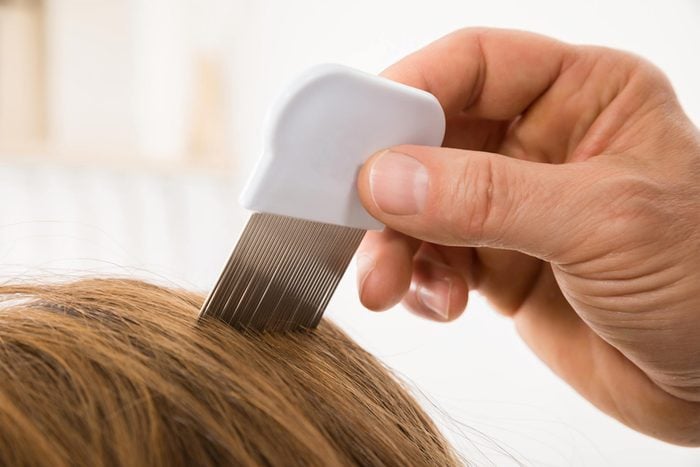
Lice
OK, let’s just get this one out of the way. Let’s say you’ve got school-age kids, and you find yourself asking, “Why does my scalp itch?” Is there any way you’re not going to wonder if it’s head lice? Head lice are tiny bugs that attach themselves to body hair, according to the Centers for Disease Control and Prevention. “Head lice can be seen in the form of eggs, aka nits, along the hair shaft,” explains Rhonda Q. Klein, MD, an associate clinical professor of dermatology at Yale-New Haven Hospital and West Haven VA Medical Center. Although the nits can be confused with dandruff, when you see adult lice moving around your head, that’s unmistakable. “You can use physical methods to remove the lice,” Dr. Klein says, “and you can try natural lice shampoos and natural lice removers, “although what you’ll probably end up needing to eradicate a lice infestation is an actual “insecticide like pyrethrin and permethrin,” depending on resistance patterns in your area. “Shaving the head is also an easy solution for boys.” Make sure you know how to spot the difference between dandruff and lice.
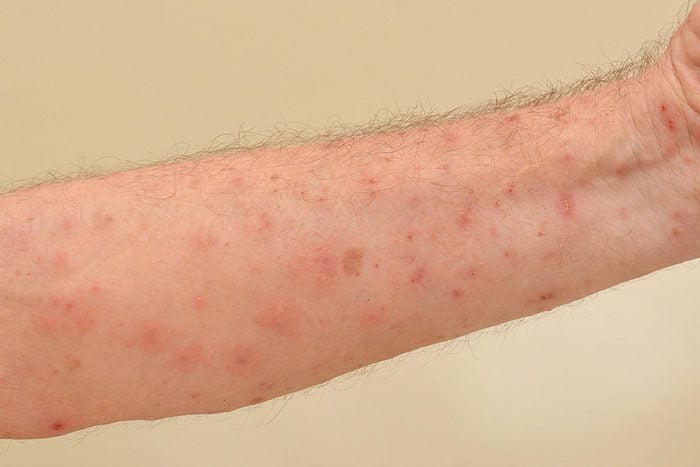
Scabies
If it’s not lice, you might wish it were when you learn about scabies, which according to Dr. Khatri can cause itching not just on the scalp but also on the entire body. Scabies on the scalp isn’t common, and it usually affects those with compromised immune systems.
Scabies are an infestation of the “human itch mite” (aka sarcoptes scabiei var. hominis). The scabies mites burrow into the upper layer of the skin, where they live and deposit their eggs, according to the CDC. The microscopic scabies mite almost always gets passed along by direct, prolonged, skin-to-skin contact with a person who already is infested. Scabies in adults frequently is sexually acquired, although it can also be spread without sexual contact in crowded conditions, including households, nursing homes, extended-care facilities, child-care facilities, and prisons.
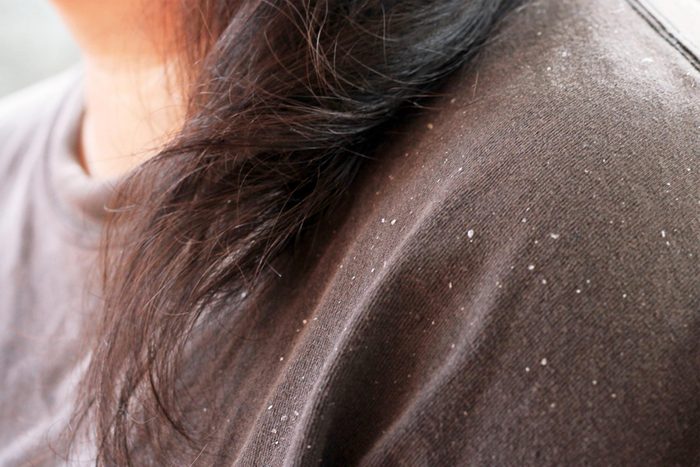
Dandruff
So, let’s say you’ve ruled out head lice and scabies. If you’re still asking “why does my scalp itch,” then dandruff is your most likely culprit. Or more specifically, seborrheic dermatitis, which is considered a severe form of dandruff caused by an overreaction the body has to normal yeast that lives on the skin, according to Jennifer Haley, MD, a board-certified dermatologist based in Scottsdale, Arizona. Dandruff affects about 40 percent of people and tends to come and go during one’s lifetime. “Weather changes, stress, and increased sugar in the diet can bring it out.”
Over-the-counter remedies include products containing the active ingredient, salicylic acid (such as Neutrogena T/Sal Shampoo) and products containing antifungals such as ketoconazole or selenium sulfide (Selsun Blue Shampoo contains the latter). Natural remedies for dandruff include tea tree oil. And a product called Scalpicin can help decrease itching, Dr. Haley advises. If over-the-counter remedies do not resolve the issue, then see a board-certified dermatologist, who can not only prescribe steroidal anti-inflammatories but also determine if some other condition is causing your itchy scalp symptoms. If you’re feeling itchy, learn about the 5 most common dandruff causes.
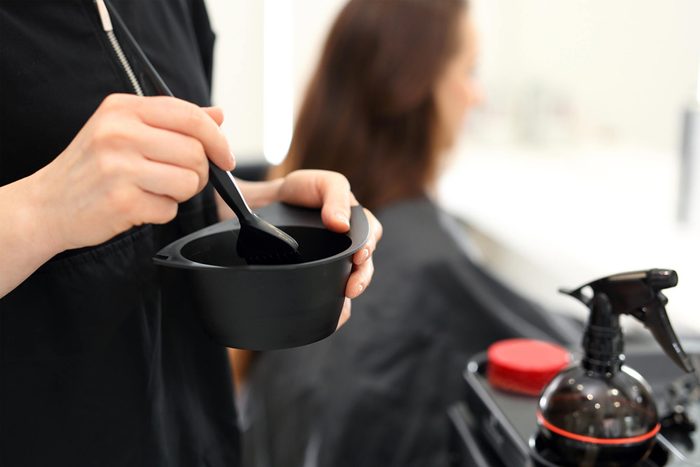
Allergic reaction
If you recently colored your hair, it’s possible that you’re experiencing an allergy to the dye. This is true even if you’ve used the product before without incident. “If the hair color is temporary or semi-permanent it can be washed out,” explains Joshua Zeichner, MD, a board-certified dermatologist and director of Cosmetic and Clinical Research at Mount Sinai Hospital in New York City, “but if it’s a permanent dye, that presents a more challenging situation, although there are products on the market that can remove permanent dye altogether.”
“People can have a reaction to anything they put on their scalp—from shampoo to hair dye to Rogaine,” points out Dr. Haley. “And don’t forget about those hair-smoothing keratin treatments, adds Dr. Klein.
To pinpoint the culprit product or ingredient suggests Tsippora Shainhouse MD, a board-certified dermatologist in Beverly Hills and Clinical Instructor at the University of Southern California, try using one product at a time for a week at a time, rather than combining many at the same time.” And then while your scalp is healing, choose only gentle and sensitive skin formulations.
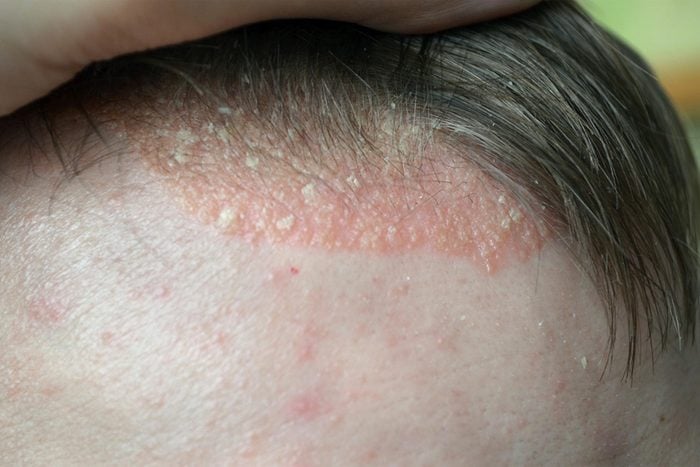
Psoriasis or eczema
An itchy scalp can also be caused by inflammatory skin conditions such as eczema (aka atopic dermatitis, especially in babies, eczema can present on the scalp) and psoriasis (which is more likely to appear on the scalp of an adult). Dr. Zeichner says explains that these conditions arise when your immune system gets “angry” at your skin, leading to red, flaky, itchy patches.
Psoriasis looks similar to dandruff but is usually thicker and red, notes Esta Kronberg, MD, a dermatologist in Houston, Texas, but it can be treated the same way dandruff is treated. For both eczema and psoriasis, Dr. Klein recommends topical steroids, vitamin D analogues (calcipotriene), coal tar, salicylic acid, excimer laser, phototherapy, and immunomodulatory agents for severe cases. For more relief, try one of these all-natural psoriasis and eczema treatments.
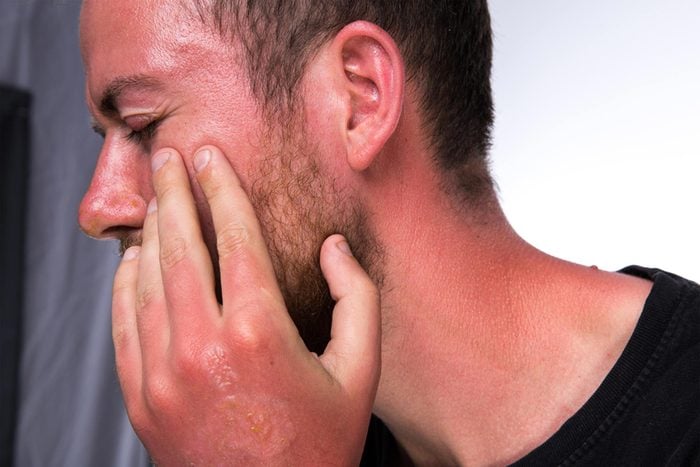
Sunburn
It’s possible that your itchy scalp is nothing more than a sunburn, Dr. Shainhouse suggests. If you’ve been out all day and forgot to wear a hat, think sunburn first, and get some relief with a cool shower and some hydrocortisone cream (available over the counter).
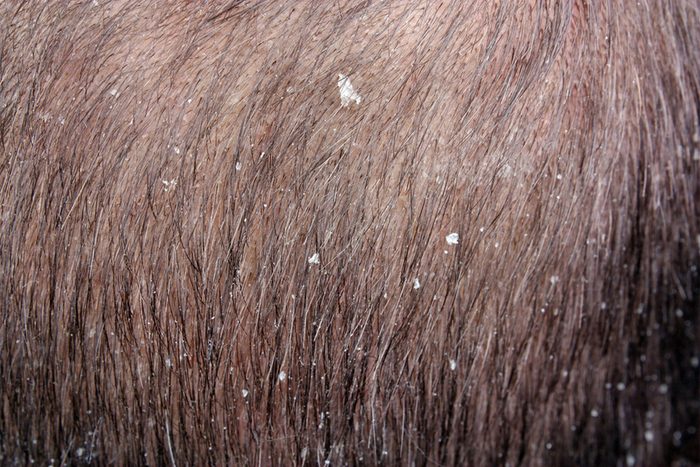
Dry scalp
The winter months can come with dry air, whether cold outdoor air or heated indoor air. The dryness strips the scalp of its protective oils, according to Dr. Shainhouse, who suggests that if your head becomes itchy in winter, your first plan of action could be to try a moisturizing hair conditioner or a once-per-week scalp and hair mask.
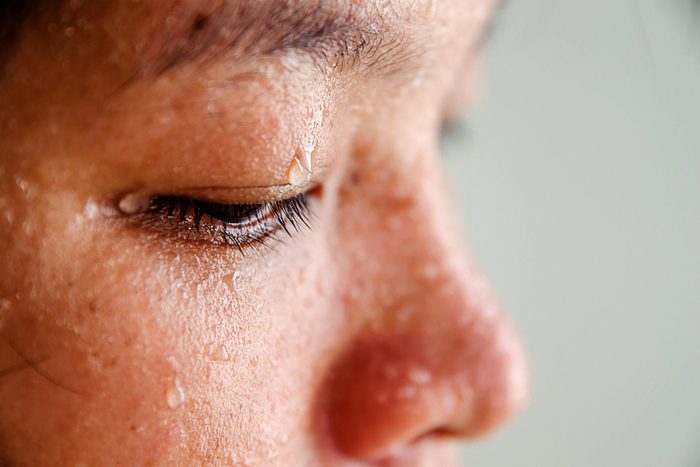
Dirt and sweat
“When you don’t wash your hair often enough, natural oils, dirt, and product residue build up on your roots and scalp, causing you to itch and scratch,” says Dr. Shainhouse. ” Scalp skin is similar to face skin and need to be washed.” Dr. Shainhouse recommends washing every other day. If you think your strands are too dry for frequent washing, flip your head into the sink and focus on the roots only. Scrub your scalp and roots with shampoo and be sure that it lathers well before rinsing in order to dissolve the excess oils and debris.
Likewise, your scalp could itch because you simply skipped your shower after a “super-soaker spin class,” Dr. Shainhouse suggests. “When the sweat on your scalp dries, it can irritate the skin, leaving it feeling itchy.” The simple solution: Wash your hair every time you sweat/work out. Plus, these 9 hacks can help treat common summer skin problems too.
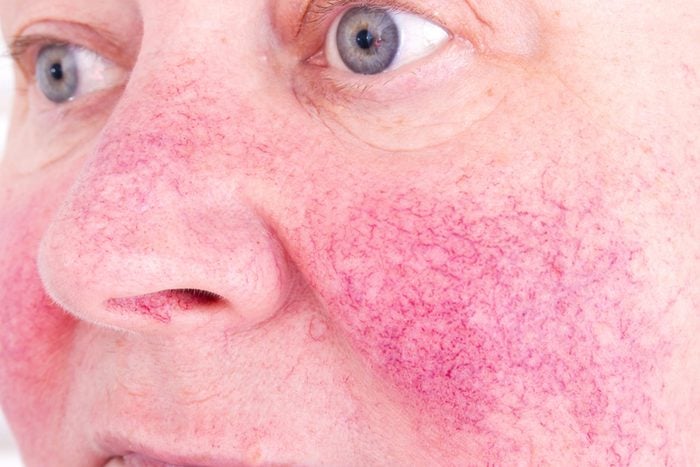
Rosacea
Rosacea classically presents as red flush and (sometimes) pimples on the face. Rosacea may flare in the heat, after eating spicy, hot, or caffeinated foods and drinks, or as a result of emotional stress, according to the American Academy of Dermatology. While it normally affects the cheeks, chin, and nose, says Dr. Shainhouse, it can potentially affect the scalp, causing an itchy or burning or stinging sensation. If you think that you might have rosacea, see your dermatologist to figure out the best management plan.
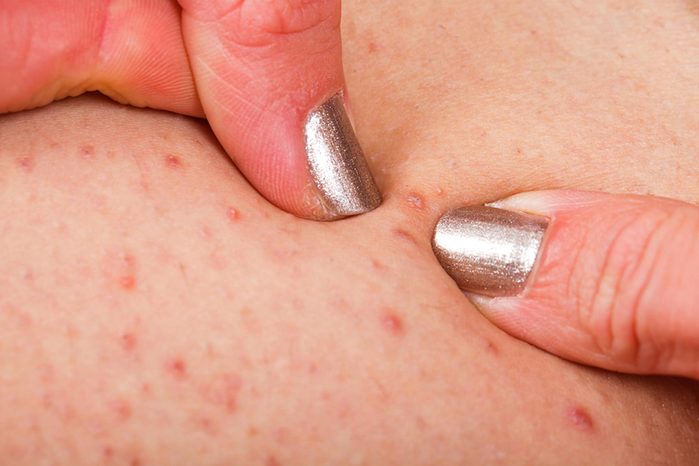
Folliculitis
If your itchy scalp is accompanied by what looks like red pimples—with a hair in the center of each one—you may be looking at a case of folliculitis, according to Dr. Khatri. The pimples may have pus in them, and they may itch or burn. When the pimples break open, they may drain pus, blood, or both.
Most of the time, the symptoms disappear on their own within a week to 10 days. Topically, you can use an antibacterial cleanser, Dr. Kronberg suggests, but if it doesn’t seem to be clearing on its own, you may need a course of oral antibiotics. Folliculitis is just one of the many skin conditions that look like acne.
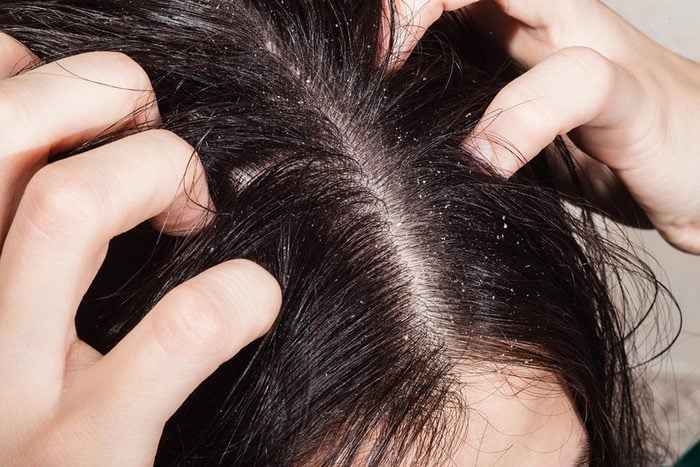
Fungus and ringworm
A fungal infection (not the same one that causes dandruff) can cause an itchy scalp as well, says Dr. Haley, although this is more common in children. It’s also called ringworm, or tinea capitis. A fungal infection can be caused by moisture remaining on the scalp for extended periods, says Dr. Kronberg. If you have one, you’ll know soon enough because it won’t respond to anything except oral antifungals, which only your doctor can prescribe.
If you have prolonged redness and scaling, especially if accompanied by pus, see your doctor. Here’s how to identify the 14 most common rashes.
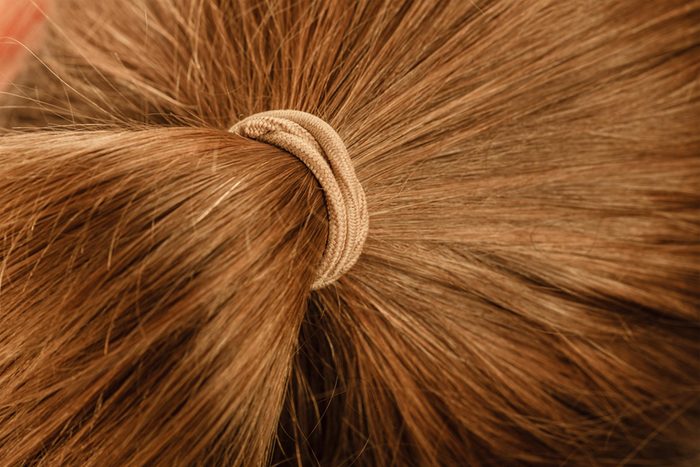
A too-tight ponytail
Like ringworm, wearing a ponytail can cause both hair loss and scalp itching. “Wearing your hair up all day, or in overly tight or heavy hairstyles such as braids, buns, extensions, and weaves, can tug on the hair follicles, causing stress and scarring over time, leading to hair thinning and hair loss,” Dr. Shainhouse says. “However, this styling also pulls the hairs and surrounding nerves and muscles in an unnatural direction, leaving your scalp sore and sometimes itchy when you let your hair down.” Dr. Shainhouse’s simple solution? Stick to looser styles, keep hair in tighter styles only for short periods, and vary your hairstyles throughout the week.
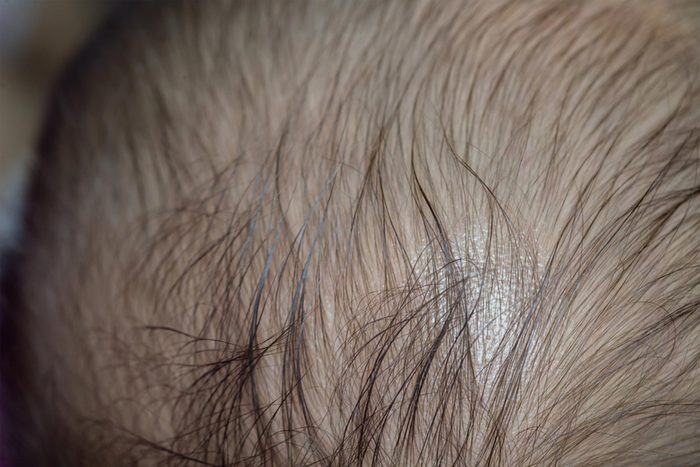
Alopecia areata
Another cause of both scalp-itch and hair loss is alopecia areata. Dr. Zeichner explains alopecia areata as a condition where your immune system “gets angry at your hair, producing cells that attack it.” Patients may develop small bald spots, or in severe cases, experience complete hair loss. One of the earliest signs of alopecia areata is itching of the scalp. So, Dr. Zeichner suggests that if your scalp itching is accompanied by hair loss that can’t be explained by ringworm or an up-do (aka traction alopecia), make sure to visit a board-certified dermatologist for evaluation. These are the 10 other itches you should never scratch.
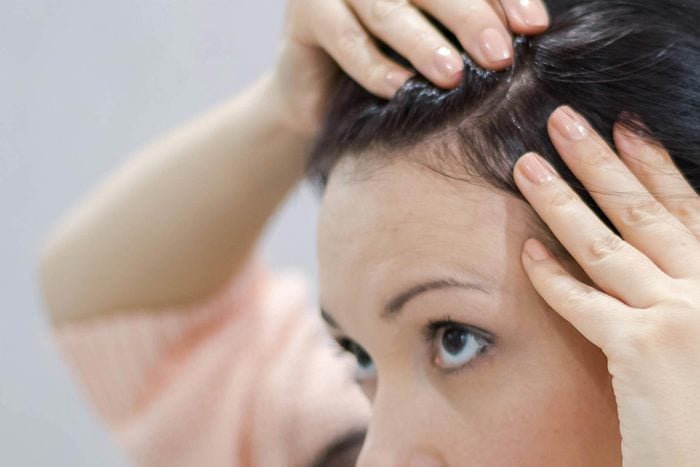
Lichen planopilaris
A far more rare cause of itching plus hair loss is Lichen planopilaris, according to Dr. Haley. Lichen planopilaris is a rare inflammatory condition that results in patchy progressive permanent hair loss mainly on the scalp. According to the American Skin Association, this condition affects around one percent of Americans, most of whom are over age 30. The aim of treatment is to slow the progression of the inflammatory process, which includes slowing the loss of hair.
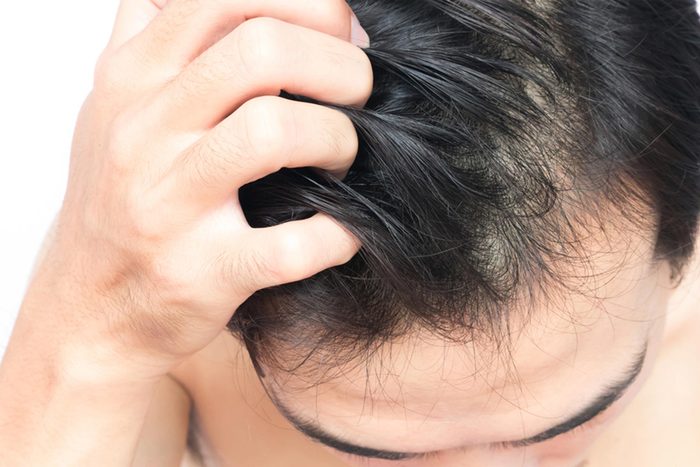
Sarcoidosis
Another unusual reason for scalp itchiness is sarcoidosis, according to Dr. Klein. Sarcoidosis is the growth of tiny collections of inflammatory cells (granulomas) in different parts of your body. Doctors believe sarcoidosis results from the body’s immune system responding to an unknown substance, most likely something inhaled from the air. Someone with an itchy scalp should not assume they have sarcoidosis, however, unless other symptoms are present, including:
- Fatigue
- Fever
- Swollen lymph nodes
- Weight loss
- Persistent dry cough
- Shortness of breath
- Wheezing
- Chest pain
- A rash of red or reddish-purple bumps, usually located on the shins or ankles, which may be warm and tender to the touch
- Disfiguring sores (lesions) on the nose, cheeks, and ears
- Areas of skin that are darker or lighter in color
- Blurred vision
- Sensitivity to light
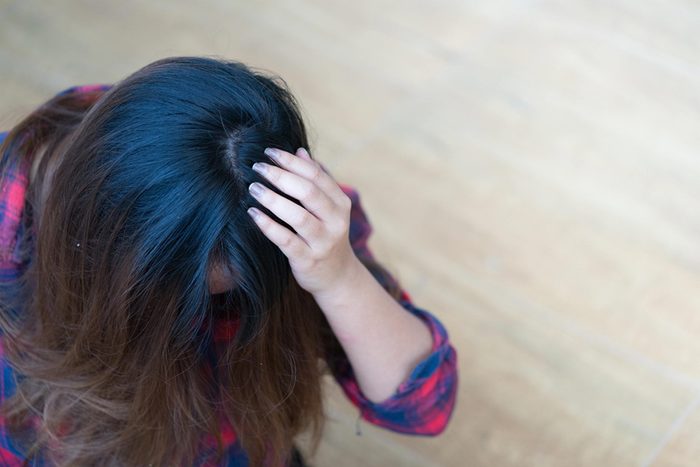
Phantom scalp itch
In rare cases, an itchy scalp has no organic cause at all, which is to say, it is accompanied by no other objective medical findings, Dr. Klein explains. This is known as scalp dysesthesia. It is often triggered or exacerbated by a psychologic or physical stressor and may be a manifestation of an underlying psychiatric issue or chronic pain syndrome. It is usually seen in elderly patients, and the key treatment is low-dose antidepressants, which Dr. Klein says can be life-changing for patients.
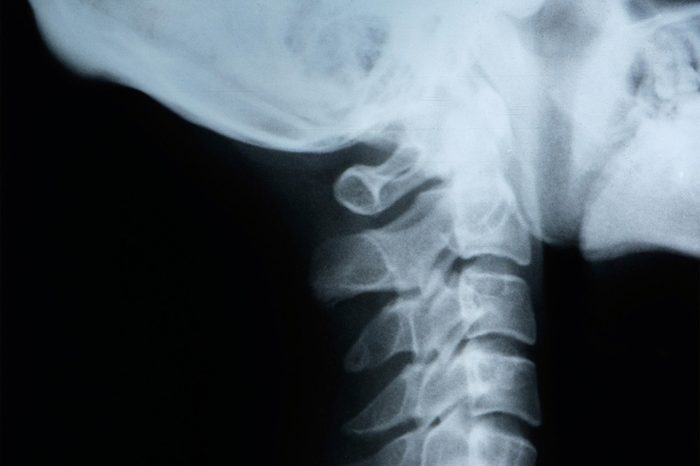
Cervical spine disease
Oddly enough, an itchy scalp that has no other cause could be a sign of cervical spine disease, which may be visible by imaging, says Dr. Klein. The mechanism here is thought to be related to chronic tension and nerve impingement. Treatment may include gabapentin (a drug used for nerve pain that also may be helpful in treating menopause-related symptoms), botox injection, and epidural injections. Here are the other diseases your itchy skin can reveal.
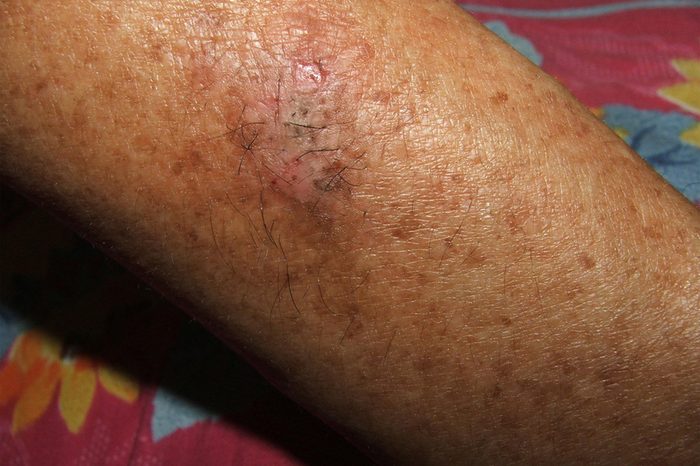
Lupus
Lupus is a serious autoimmune disease that can present with itching as well as dry scalp, says Dr. Haley, but it also involves many other symptoms, which may include arthritis, photosensitivity, oral and cutaneous ulcers, and joint pains. A skin biopsy can be helpful in ruling out Lupus. For that dry scalp, you can try adding a few of these 21 dry skin home remedies to your daily routine.
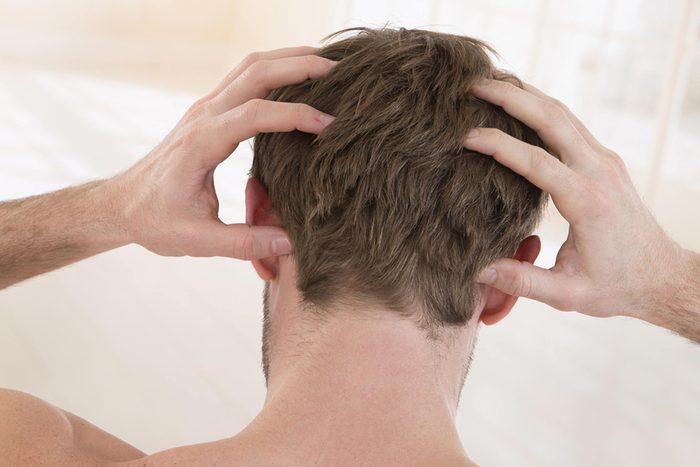
Lymphoma
In very rare cases, an itchy scalp can be a sign of lymphoma, Dr. Haley says, specifically, a form called “Cutaneous T-Cell Lymphoma.” The itching with this form of lymphoma tends to be severe and is usually accompanied by a rash and enlarged lymph nodes. It affects more men than women and tends to appear after the age of 50. A skin biopsy will be helpful in diagnosis, as well as blood testing.
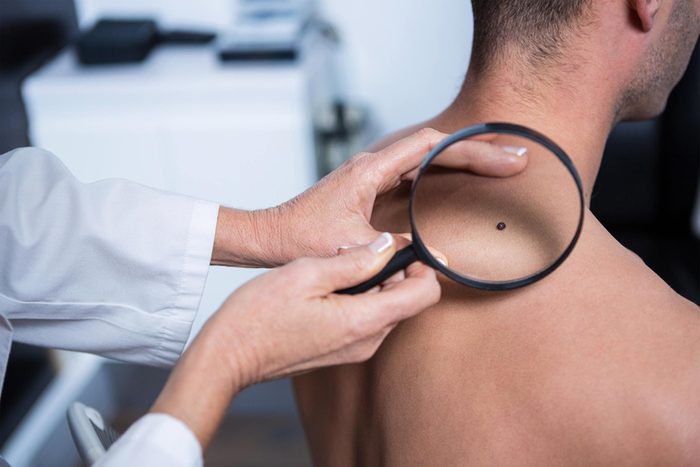
Skin cancer
Also very rarely, scalp itching will be caused by the presence of a skin cancer lesion, according to Dr. Khatri. In particular, melanoma can cause itching, but so can other forms of skin cancer. If your scalp is itchy, it’s a good idea to have someone take a look to see if there are any bumps or sores. Anything that is causing severe discomfort or that doesn’t resolve on its own within two weeks should be checked by a doctor. And make sure you never ignore these 10 scalp conditions.
